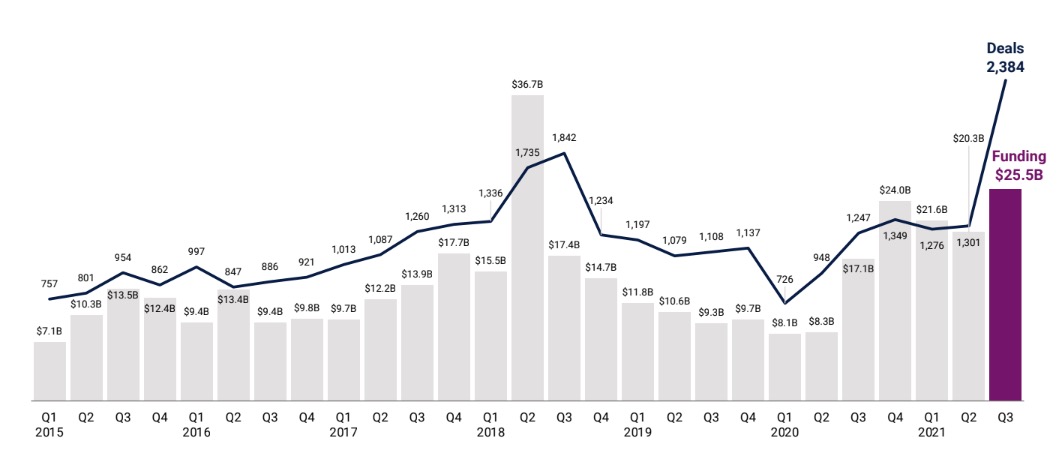Headlines from China concerning its technology market haven’t been kind in recent months. Not that they have been unfair.
The Chinese technology market has been rocked by a wave of regulatory actions in recent quarters that changed the business landscape amid crackdowns by the country’s government on other areas of national activity. Tech titans were hit with fines and business model shakeups — business model terminations, in the case of many edtech companies — while certain cultural items like celebrity fan culture and media were also taken to task.
The Exchange explores startups, markets and money.
Read it every morning on TechCrunch+ or get The Exchange newsletter every Saturday.
You might imagine that a broad push by a central government to more control both its national economy and mind wouldn’t be conducive to overall startup fundraising and activity. And yet.
When The Exchange recently looked into the Chinese venture capital market in the wake of some of its national government’s regulatory actions, things appeared surprisingly stable. Since then, data from CB Insights covering the full Q3 period has made an even stronger case: Putting aside a single outsized 2018 round, the third quarter of 2021 was the best three-month period for Chinese startups ever.
And not just in the value of the rounds they raised — they also raised more rounds.
 We were surprised. But that’s what makes data useful: No matter what you expect, what actually happened will set your thinking straight.
We were surprised. But that’s what makes data useful: No matter what you expect, what actually happened will set your thinking straight.
This morning, we’re digging into the data, looking at leading rounds to better understand where the money is going, and — with some help from TechBuzzChina’s Chinese technology analyst and angel investor, Rui Ma — trying to get our heads around what’s going on.
Let’s talk China!
China’s monster Q3
Sure, the value of Alibaba stock fell from a 52-week high of $319.32 per share to just $166.82. Didi dropped from a recent local maxim of $18.01 to $8.24. And the value of Tencent Music collapsed from $32.25 — its last 52-week high — to just $7.72 per share (all data via Yahoo Finance).
But leading tech companies’ plummeting stock prices have done seemingly nothing to blunt interest in Chinese technology startups.
Observe the following chart from CB Insights:

Image Credits: CB Insights (opens in a new window)
A quick note: Q2 2018 was the quarter when Ant Group raised a $14 billion Series C. Discounting that singular event, it’s clear that Q3 2021 was a special period with record dollars invested into Chinese startups against a huge spike in deal volume.
In some startup markets this year, we’ve seen rising dollars invested thanks to huge late-stage rounds and falling or stagnant deal counts. Simply: There is an army of funds hoping to buy pre-IPO shares in unicorns and their even later-stage brethren, but sometimes less capital for seed rounds than you might think.
Not so with China, by our read. The enormous spike in deals and the somewhat modest all-time record in dollars — Q4 2020 is right behind the new record — implies more capital for smaller upstart technology shops, which is good news for the future of Chinese startups; the pipeline is being refilled.
Underscoring that point, seven of the 10 largest seed or angel rounds that took place in Q3 2021 came from China, per CB Insights data. Most dealt with something physical, including electronics and healthcare. Those deals match our general expectation that Chinese startups would focus more on tangible activities than some other sectors of technology activity. Consumer social, for example, may be a difficult market for Chinese startups given how rapidly the Chinese Communist Party (CCP) is reshaping the consumer landscape itself.
Some market observers have read the various disbursements of thought and regulatory news from the CCP as boosting hard-tech activities like chip fabs while discouraging anything that deals with consumer sentiment or preference.
We can see a bit of that by observing the top 10 Series B rounds from Q3 2021 by size. Once again, China takes an outsized five of the 10 deals. Two of those dealt with hardware (chips, electronics, etc.), one with AI and one with logistics software. You can spy the echo of stated national priorities in those rounds.
So, are we seeing startups merely molt to match national priorities?
An ongoing shift
According to TechBuzzChina’s Rui Ma, there’s definitely been a shift in the hottest sectors: “Investments in enterprise software, healthcare and advanced manufacturing (to name three of the most popular sectors attracting investment) have eclipsed that of sectors like e-commerce, gaming and social/local, which used to be more popular.”
However, “this shift predates changes in regulation,” Ma says, noting that it started happening five years ago. So, from her perspective, what drove it in the first place?
It “was really a reaction to market conditions as consumer internet became too crowded and expensive as Chinese enterprises became more sophisticated and required more software, and the level of entrepreneurial talent continued to upgrade in China.”
Arguably, having this now line up with the CCP’s view of tech should further boost this trend — less money flowing into consumer internet, more into R&D-heavy technologies.
Perhaps more surprisingly, the tensions around trade with the U.S. could actually boost manufacturing-related technology, Ma said.
“Certain sectors like semiconductors, due to U.S. sanctions, now see much more opportunity because of the need to have a resilient supply chain,” Ma told us, referring to the U.S. government imposing restrictions on U.S. technology exports to Chinese entities, including chipmakers.
So what?
What is not clear at this juncture is how Chinese venture capital will continue to attract external versus internal capital. Will foreign investors be able to continue finding exposure to the Chinese startup market, and will they even want to?
Also, there’s a natural cap to Chinese startups, given that they haven’t historically succeeded outside their national boundaries as well as they have inside of them. Will a geographically — and therefore demographically — constrained environment prove attractive to startups in the long term? And will future regulatory activity by the Chinese government manage to impact startup investing in the future?
We do not know. But investors are laying bets like they do, which is worth noting.
